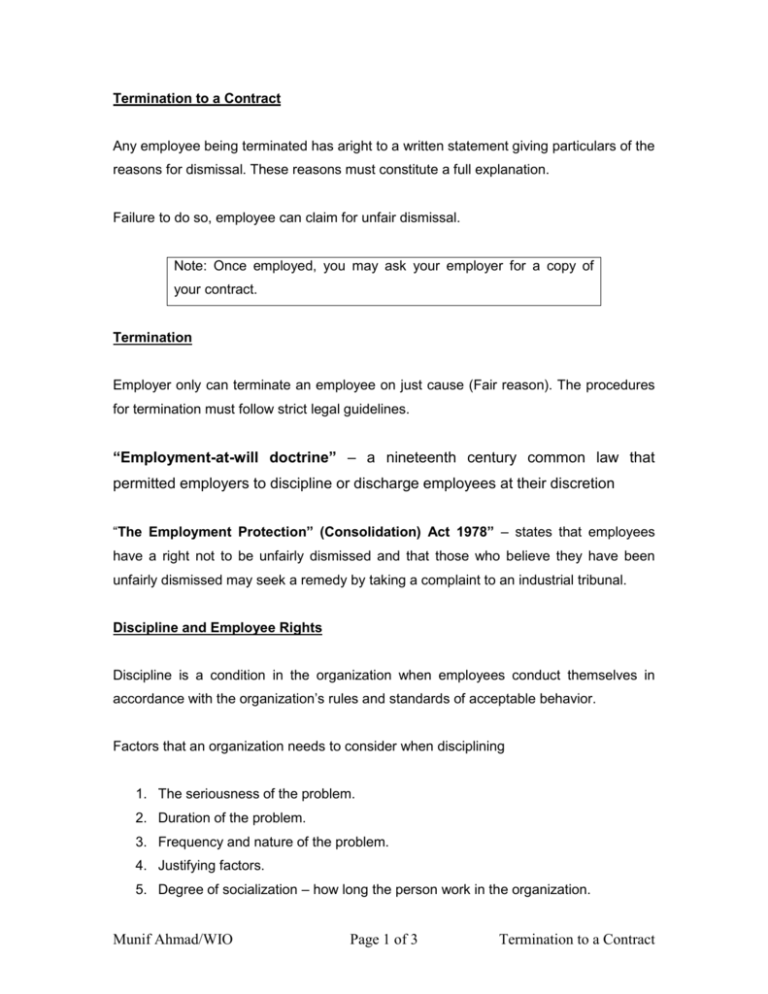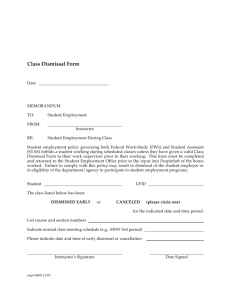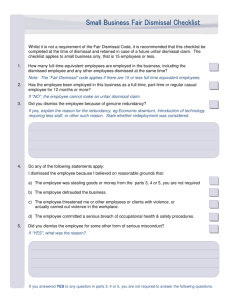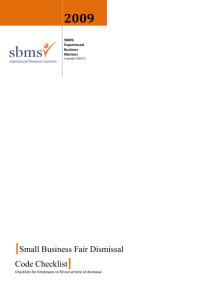Termination to a Contract
advertisement

Termination to a Contract Any employee being terminated has aright to a written statement giving particulars of the reasons for dismissal. These reasons must constitute a full explanation. Failure to do so, employee can claim for unfair dismissal. Note: Once employed, you may ask your employer for a copy of your contract. Termination Employer only can terminate an employee on just cause (Fair reason). The procedures for termination must follow strict legal guidelines. “Employment-at-will doctrine” – a nineteenth century common law that permitted employers to discipline or discharge employees at their discretion “The Employment Protection” (Consolidation) Act 1978” – states that employees have a right not to be unfairly dismissed and that those who believe they have been unfairly dismissed may seek a remedy by taking a complaint to an industrial tribunal. Discipline and Employee Rights Discipline is a condition in the organization when employees conduct themselves in accordance with the organization’s rules and standards of acceptable behavior. Factors that an organization needs to consider when disciplining 1. The seriousness of the problem. 2. Duration of the problem. 3. Frequency and nature of the problem. 4. Justifying factors. 5. Degree of socialization – how long the person work in the organization. Munif Ahmad/WIO Page 1 of 3 Termination to a Contract 6. History of organization’s discipline practice. 7. Management backing. Severity of Progressive Discipline Written Written verbal warning Suspension Dismissal warning Dismissal should be used only for the most serious offences. How do we know that an employee is dismissed? Employees are treated as dismissed if: The contract of employment is terminated with or without notice. A fixed-term contract expires without being renewed. They leaved their employment due to their employer’s conduct, such that they are justified in terminating their employment without notice. How do we know that the dismissal is fair or not? It is difficult to differentiate between a fair dismissal and unfair dismissal. Fair dismissal Dismissal is considered if employees are dismissed for the following reasons. 1. Capability or qualifications for the work which the employee must do. This covers employee incompetence, short and long-term sickness and lack of qualification to do the job. 2. Conduct. A wide range of employee misconduct can lead to justifiable dismissal. If an offence entails gross misconduct – e.g. damage to company property, insubordination or acts of violence – dismissal can take place without notice. Munif Ahmad/WIO Page 2 of 3 Termination to a Contract 3. Redundancy. Here the law is concerned with whether the employed acted reasonably in selecting employees for redundancy. 4. Situations where continued employment of a worker would be illegal. For example, a driver who is disqualified from driving could be fairly dismissed. 5. Some other substantial reason. This cover justifiable reasons which do not come under the above categories. Employer must be able to prove that he employee was dismissed for any of the above reasons. Unfair Dismissal Unfair dismissal takes place when an employee is dismissed for any of the following: 1. Unfair selection for redundancy. 2. Dismissal of women for pregnancy. 3. Dismissal for union membership or activities, or for refusal to join a union. Who can claim for the unfair dismissal protection? The employment Protection (Consolidation) Act 1978 say that those who can claim for unfair dismissal are those that are under any of the categories below: Full-timers: employed for 16 or more hours per week for 2 years or more. Part-timers: working between 8 and 16 hours per week for 5 years. If an employee is entitled to make a claim for unfair dismissal, it must be lodged with an industrial tribunal within 3 months. What do an employee who won the case of unfair dismissal is entitled to? If an employer has failed to comply with an order to re-employ on employee, an additional award may be given. Such awards may be reduced if the tribunal believes that the employee’s conduct contributed to his or her dismissal. Munif Ahmad/WIO Page 3 of 3 Termination to a Contract




